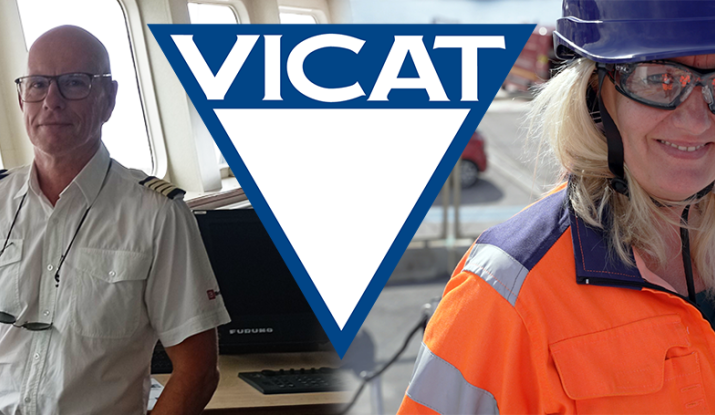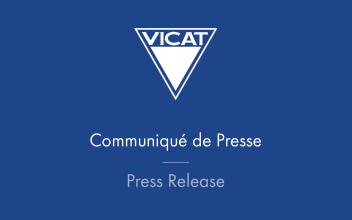Heading for Nice: immersion in the daily life of Karine and David
As the third United Nations Conference on Oceans takes place in Nice, we met with Karine Faivre, Director of Maritime Operations, and David Lefevre, Captain of the M/V Capo Cinto—both of whom have direct links with the sea.
Could you explain your role? What does your typical day look like?
Karine Faivre: "My role consists of managing and supervising maritime operations related to the transport of our products, particularly via our ship, the MV CAPO CINTO. It's a job position between the sea and the land, resolutely focused on customer satisfaction. This includes managing the chartered fleet (bulk carriers or others), coordinating with ports, factories, and end customers, logistics planning, and compliance with maritime regulations. All with a clear objective: to guarantee the operational, financial, and environmental performance of our transport. This position acts as a true operational funnel: all technical, logistical, and human requirements converge here. We must ensure that each chartered vessel meets the safety, compliance, and efficiency standards expected by the ports that host it and by our partners. In short, it means putting the sea at the service of the industrial supply chain, to guarantee a smooth, safe, and efficient flow, for the direct benefit of our customers."
David Lefevre: “I always start my day with a breath of fresh air on one of the bridge wings with a cup of coffee (just kidding 😊) it's a sailor's privilege, a moment of relaxation that you never tire of and that easily leads to reflection. I start very early, often between 6 and 7 a.m., taking information from the officer of the watch: weather, shipping traffic, notices to mariners, exchanges with the authorities, and nightly review with the first mate. If I haven't been woken up, it's because everything went well. Then I go through the checklists, as in aviation, to make sure that everything is technically and humanely ready. Port entry and exit maneuvers are the most sensitive, especially in bad weather. We take the pilot on board at the scheduled time - mandatory for vessels over 50 meters. We discuss the maneuver and check the critical points, but I alone am responsible for the decisions. In general, it takes around thirty minutes from the moment the pilot takes over to the moment we dock. Around 7:30 am, commercial operations begin: loading or unloading, coordination with port agents, customers and dockers. At 8 a.m., I switch to the administrative side: daily reports, exchanges with the sales team, management of crew changes, follow-up of maintenance and certificates. After a short lunch break, I resume ballasting operations to adjust the vessel's stability. In the late afternoon, I prepare for departure: navigation plan, departure documents, safety tests with the crew. Once the ship is underway, I let the first mate take over the watch. I return to the bridge at 8pm for my night watch, accompanied by the boatswain. At midnight, I hand over instructions to the next crew. This rhythm is repeated for six weeks, with periods of standby to allow the crew to take a breather and carry out some maintenance.”
What skills are essential?
K. Faivre: “You need a global vision of the logistics chain, solid expertise in maritime transport, and unfailing operational rigor. Anticipation of contingencies (weather, congestion, technical incidents), the ability to manage multiple priorities and to steer charter contracts are essential. But beyond the technical aspects, this job requires cross-functional management skills: you need to know how to dialogue with a wide variety of players - carriers, operators, shipping agents, pilots, harbor master's offices, customers - reconciling their constraints while ensuring that the Vicat Group's priorities are met. Agility, responsiveness and a sense of teamwork make all the difference. And above all, keeping calm in all circumstances!”
D. Lefevre: “A sense of responsibility is important; you are the guarantor of the safety of the ship and the crew. The captain represents the shipowner's interests, and Vicat's image in our operating ports is closely linked to the crew's responsible and professional attitude. A courteous attitude and an ability to compromise are necessary with all those involved in our business. Leadership too; you must lead the crew and the ship to achieve the mission for which they are intended. You have to be a unifying force; the crew will follow you if they have confidence in you. You need to be self-reliant, calm and able to make decisions quickly if necessary. You're your first rescuer, so there's no need for doctors or firemen to help you on site, except when you're docked, of course. Apart from technical skills, interpersonal skills play a predominant role. You need to be able to impose your ideas but also be a good listener. “Lead by example” is my motto; don't ask others to do what you can't do yourself."
How do you manage a crew, or coordinate between land and sea?
K. Faivre: “It's a job of constant liaison with the crew. Every port of call, every maritime operation is the fruit of meticulous coordination between the teams ashore and those at sea. It's not a job you can do alone. It relies on a remarkable collective effort: plant operators, transport teams, ship management, stevedores, shipping agents, harbor master's offices, harbor pilots... It's a human and technical chain that only works if everyone plays their part with professionalism and commitment. And that's what ultimately guarantees the fluidity and reliability of maritime transport.”
D. Lefevre: “You are the mayor, the sheriff, the doctor and the animator of this small village, you live with your constituents 24/7, and more seriously, you must support them in their professional development, asking for promotion whenever possible. You need to know the strengths and weaknesses of each member of your crew, so you can place the right person in the right place at the right time. Know how to delegate important tasks: trust is essential. Protect your team from accidents, train, coach, help your colleagues to make the right decision, provide answers to questions whenever possible. Put the general interest first. Manage the administrative side of certificates, to ensure that everyone has their documents up to date. Carry out evaluations at the end of boarding and plan the return home for everyone. The psychology and interpersonal skills of our crew are key.”




